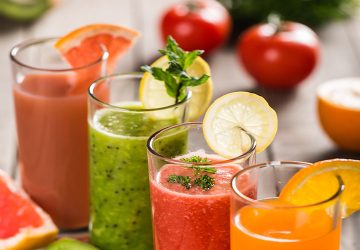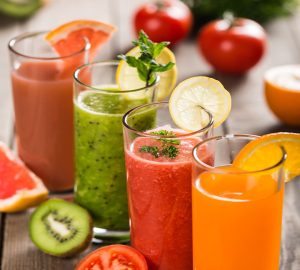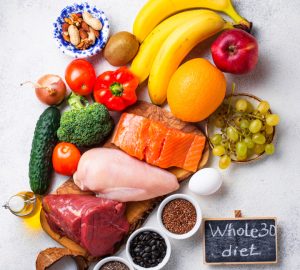[ad_1]
In the ever-evolving landscape of nutrition and diet trends, one approach has consistently garnered attention for its potential benefits in weight management and overall health: the high-protein, low-carbohydrate diet. It has been making waves in the world of nutrition as it helps you shed pounds and keep those hunger pangs at bay. But how does this diet work? Is it a healthy option? We will help you break it down, right here. This article explores the benefits, risks, and everything else you need to know about this diet plan. Keep reading to know more!
 At A Glance
At A Glance- Principle: A combination of Mediterranean and DASH diets that is rich in healthy fats and fiber and low in sodium.
- Purpose: To improve brain health and reduce the risk of neurodegenerative diseases.
- Who It Is For: People showing signs of cognitive impairment.
- Duration: Long-term
- Who Should Avoid: People with celiac disease or lactose intolerance.
- Cons: Heavy focus on foods that people are commonly allergic to, like seafood and nuts.
What Is A High-Protein, Low-Carb Diet?
A high-protein, low-carb (HPLC) diet limits your carbohydrate intake and focuses on higher protein consumption. However, there is no strict rule for how much protein or carbs you should eat, and it can vary from person to person.
For a diet to be considered low-carb, it should have less than 130 grams of carbs per day or carbs should make up less than 26% of the daily macronutrient intake (1). High-protein diets require you to have more protein than what is usually recommended. As per the Recommended Dietary Allowance (RDA), the required amount of protein is about 0.8 grams per kilogram of body weight (2). So, on a high-protein diet, you may consume between 1.8 and 3 grams of protein per kilogram of body weight each day (3).
In a 2,000-calorie high-protein, low-carb diet, you may eat 26% carbs, 40% fat, and 34% protein (of the daily macronutrient intake). Someone weighing 150 pounds (68 kilograms) should aim for around 170 grams of protein each day.
Protein and carbohydrates are two essential macronutrientsi XThe essential nutrients that your body requires in large quantities to maintain overall health and function optimally. necessary for a balanced diet. Let us find out how they help in the functioning of your body.
Role Of Protein And Carbohydrate In The Diet
Protein is a major component of the skin, muscles, bones, organs, hair, and nails. Dietary protein helps prevent lean body massi XThe total weight of your body minus all the weight attributed to fat, such as muscles, bones, organs, skin, and fluids. loss and promotes growth and repair of the body (2). Moreover, adding high-quality protein to every meal may encourage muscle protein production, support muscle well-being, and help maintain lean body mass as you grow older (4).
 Did You Know?
Did You Know?Carbohydrates are crucial for the body as they provide energy to all the cells in the body as well as dietary fiber (6). The digestive tract begins to break down carbohydrates into glucose, the main energy source for the body, brain, and central nervous system, upon consumption (7). They also help manage blood sugar levels, play a role in cholesterol and fat processing, and aid digestion. Learn more about these benefits of a high-protein, low-carb diet in the next section.
Benefits Of A High-Protein, Low-Carb Diet
1. Aids In Weight Loss
According to a study, low-carbohydrate diets are effective at improving weight loss, HDL, and triglyceridei XA common type of fat found in your blood. It is derived from the foods you eat and the fat your body creates from excess calories. levels (8). A low-carbohydrate diet may increase insulin sensitivity and decrease serum insulin concentration, which are associated with increased satiety. Likewise, a high-protein diet also has weight-loss effects and may prevent weight regain. Protein increases the levels of hormones that help in increased satiety signaling, leading to reduced food intake (9).
Another study found that people with obesity who followed a low-carb, high-protein diet providing 30% carbohydrate, 30% protein, and 40% fat achieved a 4.8% weight loss (10). This may be because low-carb diets can produce a higher metabolic burn than high-carb diets. Research shows that a low-carb diet offers a metabolic advantage of approximately 200 to 300 more calories burned compared to an isocaloric high-carb diet (11). Therefore, this is an effective short-term plan for weight loss.
2. May Manage Blood Sugar Levels
A high-protein diet containing low to moderate amounts of carbohydrates increases insulin secretion and glucose uptake, thus improving insulin sensitivity (12). In a study conducted on people with type 2 diabetes, an improved glycemic responsei XThe level and speed at which your body’s blood sugar levels react after you consume carbohydrates from food. was observed. The serum insulini XRefers to the concentration of the hormone insulin in the liquid component of your blood, i.e., serum. was decreased and plasma glucagoni XA peptide hormone produced by the alpha cells of the pancreas and present in the liquid component of your blood, i.e., plasma. was increased. Thus, this diet may help manage glucose levels in people with untreated type 2 diabetes (13).
Low-carb diets are based on the idea that reducing insulin levels, a hormone that promotes fat storage, may enhance heart health, aid in weight loss, and improve metabolic function (1). Dietary carbohydrates increase insulin needs, and reduction of carbohydrate intake can improve glycemic control. Thus, people reducing their carbohydrate intake may also be able to improve their sugar levels and manage diabetic conditions. However, more research is required to prove all these claims about high-protein, low-carb diets.
3. May Control Triglyceride Levels
High triglyceride levels lead to an increased risk of cardiovascular diseases and obesity (14). A study conducted on men and women with obesity found that the consumption of a low-carb, high-protein diet resulted in weight loss and helped reduce plasma triglyceride levels in the blood, mainly due to the salt and water loss and caloric restriction. However, the same study reported an increase in LDL (bad) cholesterol, uric acid, and free fatty acid levels (15). Thus, more research is required to understand the effects of a high-protein, low-carb diet on cholesterol levels.
4. May Help Maintain Muscle Mass
A low-carb and high-protein diet may help decrease fat mass and increase lean body mass. Basically, this diet can reduce the loss of muscle mass and increase the loss of body fat during weight loss, thus maintaining muscle mass during periods of restricted energy intake. It also increases muscle protein synthesis (16).
Since both protein and carbohydrates are equally needed to improve your health and fitness level, it is important to know which foods to include in your diet. Check out a high-protein, low-carb foods list in the next section.
Foods To Eat On A High-Protein, Low-Carb Diet
Here is a list of foods that are rich in protein and low in carbs that you can include in your diet plan.
| Food Item | Protein (in 100 g) | Carbs (in 100 g) |
|---|---|---|
| Shrimp | 20.1 g | 0 g |
| Egg | 12.6 g | 0.72 g |
| Scallops | 16.96 g | 2.68 g |
| Canned tuna | 25.5 g | 0 g |
| Pork | 21 g | 0 g |
| Lobster | 19 g | 0 g |
| Pumpkin seeds | 30.2 g | 10.7 g |
| Venison | 23.2 g | 0 g |
| Salmon | 19.8 g | 0 g |
| Greek yogurt | 9.95 g | 3.94 g |
| Tofu | 17.3 g | 2.78 g |
| Chicken | 31 g | 0 g |
| Beef | 17.2 g | 0 g |
| Sardines | 24.6 g | 0 g |
| Seitan | 24.7 g | 5.88 g |
Source: USDA
While adding the above foods to your meal plan, be wary of other ingredients. Keep reading to check out which foods you need to avoid while following this diet.
Foods To Avoid On a High-Protein, Low-Carb Diet
When following a high-protein, low-carb diet, it is important to decrease your consumption of high-carb foods. So, you will have to avoid or limit a few carb-rich foods in this diet. These include:
- Breads and other baked goods
- Sugar-rich foods, drinks, and sweeteners
- Grains
- Pasta
- High-carb fruits, such as mango, banana, pineapple, and fruit juices
- Beans
- Lentils
- Starchy vegetables, like potatoes, corn, carrots, and green peas
- Processed high-carb foods, like chips and crackers
- Alcohol
Though it is best to avoid these foods, you can consume some starchy vegetables and fruits if you are not exceeding the daily carb limit.
Now, check out a simple meal plan you can follow on this diet.
High-Protein, Low-Carb Diet Meal Plan
The following is a sample 3-day meal plan comprising meals and snacks that are high in protein and low in carbs. Each person’s meal plan should be customized based on their food preferences and body weight. For a person weighing 68 kg (150 lb), it is best to consume 170 g of protein per day and less than 130 g of carbohydrates but more than 50 gm per day.
| Day 1 | Breakfast: An omelet (two whole eggs and one egg white) with a sliced avocado, mushrooms, spinach, and red pepper.
Lunch: 1 bowl green salad topped with fresh non-starchy vegetables, chickpeas, and shrimp. Dinner: Baked cod (85-115 g) served with zucchini fries and a Cesar salad Snacks: 1 bowl of cucumber and broccoli with garlic hummus with nuts |
| Day 2 | Breakfast: 1 bowl of Greek yogurt topped with crushed almonds, blackberries, and chia seeds
Lunch: Grilled chicken (85-115 g) and a non-starchy vegetable bake Dinner: Grilled shrimp (85-115 g) with a dollop of Greek yogurt and a bowl of vegetable soup Snacks: 1 glass of protein shake made with cocoa powder and topped with berries |
| Day 3 | Breakfast: 1 bowl of chia pudding with a scoop of collagen powder
Lunch: 1 protein bowl with a small amount of regular rice Dinner: Garlic tofu (85-115 g) with a bowl of sheetpan (non-starchy) vegetables Snacks: A cup of blackberries with peanut butter and celery sticks. |
Note: It is best to consult a dietician to get a personalized meal plan. This way you can avoid any unhealthy triggers and reduce health risks.
 Quick Tip
Quick TipIt is best to plan your meals in advance. Keeping a go-to high-protein, low-carb food list and approved ingredients stocked at home makes it easy to prepare meals. You may also maintain a food journal to keep track of your macronutrient intake.
A big part of sticking to any diet is ensuring you have food that you find delicious and satisfying. Check out the next section for a few tasty recipes you can try out.
High-Protein, Low-Carb Diet Recipes
1. High-Protein, Low-Carb Breakfast
Chocolate-Raspberry Chia Pudding
Ingredients
- 2 tablespoons chia seeds
- 1 cup almond milk
- 1 tablespoon raw organic cocoa powder
- Handful of fresh raspberries
- Handful of coconut flakes
How To Prepare
- Mix the chia seeds, almond milk, and cocoa powder in a jar.
- Stir well and cover with a lid.
- Place the jar in the fridge for at least 30 minutes or overnight.
- Top it with berries and coconut flakes.
2. High-Protein, Low-Carb Lunch
Steamed Salmon And Brown Rice
Ingredients
- 200 g brown rice
- 100 g green beans
- 200 g bok choy (chopped into chunky pieces)
- 4 salmon filets (100 g each)
For the dressing
- 4 tablespoons sweet soy sauce
- Juice of 3 limes
- 1 red chili (chopped and deseeded)
- 1 tablespoon rice vinegar
- 1 tablespoon golden caster sugar
How To Prepare
- Mix all the ingredients for the dressing together and set aside.
- Boil the rice in plenty of water and drain when just cooked.
- Place the vegetables and fish in a large steamer in two layers.
- Steam the fish for 5-8 minutes and the vegetables for 4-5 minutes until cooked through.
- Transfer the rice into two bowls.
- Top with the steamed fish and vegetables.
- Pour some dressing all over the salmon and rice.
3. High-Protein, Low-Carb Dinner
Garlic Tofu
Ingredients
- 1 pack of medium-firm tofu
- 2 cups water
- 1 tablespoon salt
- 2 tablespoons minced garlic
- 1 tablespoon soy sauce
- 2½ tablespoons vegetarian oyster sauce
- 1-2 green onions (chopped)
- 1 red chili (chopped)
- ½ tablespoon sesame seeds
- 1 tablespoon sugar
- 1-2 tablespoons cilantro (chopped)
- 4 tablespoons olive oil
How To Prepare
- Mix the salt into the water.
- Cut the tofu into bite-size pieces and soak it in the salt water for at least 5-10 minutes.
- Heat the olive oil to prepare the sauce.
- Mix the garlic, green onion, red chili, and sesame seeds in a bowl.
- Once the oil is hot, pour it all over the ingredients in the bowl.
- Add the soy sauce, vegetarian oyster sauce, and sugar to the bowl.
- Mix well and set aside.
- Line the air fryer with the tofu pieces and brush them with olive oil.
- Cook them at 400°F for 20 minutes, flipping halfway.
- Place the tofu pieces in a bowl and pour the sauce all over it. Mix well.
- Garnish with cilantro.
It is important to have a well-balanced diet with both plant- and animal-derived proteins. Keep reading to learn some tips to follow this diet the healthy way.
How To Stay Healthy On A High-Protein, Low-Carb Diet
Here are a few tips for staying healthy on a high-protein, low-carb diet:
- Consume plenty of fiber to maintain optimal digestive health. Dietary fibers help slow down digestion, making you feel fuller for longer, and control blood sugar levels and cravings. Low-carb foods like oats, barley, legumes, peas, beans, broccoli, carrots, and most root vegetables are high in fiber (17).
- Always ensure you add enough protein through plant- and animal-derived sources rather than supplements and powders. Always consult your doctor before taking any supplements or protein powders.
- If you are new to this diet, make sure you transition to it slowly. A very low-carb diet may not be suitable for you. Start with a more moderate low-carb, high-protein diet. It will help you get adjusted to the new dietary pattern and avoid the fatigue associated with a sudden transition.
- Keep yourself hydrated with water-rich vegetables and low-carb beverages like herbal tea, normal water, and lime water. It will promote digestion and make you feel fuller for longer (18).
- Following a consistent exercise routine along with this diet plan will help improve your health in several ways.
There are no set rules for a high-protein, low-carb diet. It can be incorporated into a variety of diets. Let us find out which other popular diet style suits this eating pattern.
How A High-Protein, Low-Carb Diet Compares To Other Diets
- Intermittent Fasting: It focuses on weight loss via restricting your eating time period. You can eat only for 8 hours and fast for the remaining 16 hours. Since it is a time-restricted diet style, you can pair a high-protein, low-carb diet with intermittent fasting.
- Keto Diet: It requires the intake of macronutrients in a very specific ratio to reach and maintain ketosis so you can lose weight. In this diet, carb intake is very low and protein intake is at a moderate level.
- Atkins Diet: Though it is a low-carb diet that requires a higher protein intake than the recommended amount, it is not a high-protein diet. It involves only a moderate amount of protein, and the macronutrient range also changes as the diet progresses.
- Mediterranean Diet: It is rich in whole, nutrient-dense, and high-carb foods like beans, vegetables, and nuts and is not a low-carb or high-protein diet. Therefore, you may not be able to combine the two diets.
While a high-protein, low-carb diet certainly offers certain benefits, following it for a long period may result in some health complications. Learn more about them in the next section.
Risks Of Following A High-Protein, Low-Carb Diet
Though this diet is generally considered safe and effective for a short period, it may not be the same in the long run. Low carbohydrate-high protein diets, when followed regularly and without consideration of the nature of carbohydrates or the source of proteins, are associated with an increased risk of cardiovascular disease (19). Moreover, severely restricting carbohydrate intake may result in untoward side effects like nausea, fatigue, and electrolyte loss. Therefore, the lower limit of carbohydrate consumption should not be less than 50 g a day (20).
The tolerable upper limit for protein consumption is 3.5 g per kg bodyweight per day for well-adapted subjects (21). According to research, bone, kidney, and liver disorders and increased risk of coronary artery disease and cancer are the adverse effects associated with the long-term consumption of a high-protein diet (22). Therefore, people on high-protein, low-carb diets should choose their source of protein very carefully. Many protein-rich foods of animal origin contain high levels of saturated fats and cholesterol. This may lead to a higher risk of heart disease, hyperlipidemiai XA medical term used to refer to an abnormally high level of lipids (fats) in the bloodstream, including cholesterol and triglycerides. , and hypercholesterolemiai XA medical term used to refer to the presence of abnormally high levels of cholesterol in the blood. (23).
Also, low-carbohydrate dietary patterns focused on animal-derived protein and fat sources were associated with higher mortality, whereas those that favored plant-derived protein were associated with lower mortality (24). Therefore, it is important to maintain a balance between these two sources of protein instead of only relying on animal meat for protein.
Some low-carbohydrate plant-derived protein sources include non-starchy vegetables, nuts, peanut butter, and whole-grain bread. Foods that are low in saturated fats and cholesterol include wheat gluten, textured vegetable protein, cottage cheese, Greek yogurt, egg, lentils, edamame, and split peas.
The high-protein, low-carb diet is a flexible approach to nutrition that can be tailored to individual preferences and needs. Since there is no one-size-fits-all formula, striking the right balance between these two macronutrients is key to achieving optimal health and fitness. From aiding weight loss and managing blood sugar levels to maintaining muscle mass, this diet can help improve your overall well-being. However, it should not be continued for a long period as it may cause heart disease and affect kidney function.
Frequently Asked Questions
Can I follow this diet if I am vegetarian or vegan?
Yes, you can consume beans, lentils, peas, and whole grains if you are a vegan or vegetarian. In order to meet your protein needs, you will have to include more soy products and nuts and seeds in your diet. High-quality dairy and eggs are also good food choices for a vegetarian.
Can I eat fruits on a low-carb, high-protein diet?
Yes, you can eat fruits on a low-carb, high-protein diet, but you should choose low-carb fruits in moderation. Berries and melons are good options as they are relatively low in carbohydrates compared to fruits like bananas and grapes.
Can I exercise on this diet?
Yes, you can exercise on a low-carb, high-protein diet. Regular exercise can complement this diet by helping you maintain or build lean muscle mass and improve your overall health. It is advisable to gradually adapt to the diet and monitor your energy levels to find the right balance of carbohydrates and other macronutrients that work for you while exercising.
How long should I follow this diet?
The duration depends on your personal preference and how well you adapt to the diet. However, it is best to not continue it for longer periods. Consult with a healthcare professional or registered dietitian before starting this diet.
Is the low-carb, high-protein diet suitable for athletes or individuals with high activity levels?
Athletes or individuals with high activity levels may require more carbohydrates for sustained energy. Maintaining the right balance of carbohydrates, protein, and fats while ensuring adequate nutrient intake is essential to support athletic performance and overall health. Therefore, make sure you consult your fitness trainer and dietitian to plan your meals.
Are there any recommended supplements for people on a low-carb, high-protein diet?
There are a few common supplements that individuals on a low-carb, high-protein diet can consume. They are mainly multivitamins, magnesium supplements, whey protein, and protein capsules. However, you must consult your doctor before taking any of these supplements.
How can I manage cravings for carbs while on a low-carb, high-protein diet?
Manage your cravings through mindful eating and healthy snacking. Choose low-carb, high-protein snacks like Greek yogurt, cottage cheese, or a handful of nuts when you need a snack between meals. You can also indulge in small, planned, and occasional treats to satisfy cravings. Just be mindful of the portion sizes and frequency.
Key Takeaways
- The high-protein, low-carb diet focuses on consuming less carbohydrates and more proteins than the recommended amounts.
- It can help you lose weight, manage glucose levels, maintain muscle mass, and regulate sugar levels.
- However, the long-term consumption of high-protein and low-carbohydrate foods may affect your heart, liver, kidney health.
- Ensure you consume plenty of fiber and stay hydrated to follow this diet in a healthy way.
Upgrade your diet with a healthy and delicious meal. Check out this video for a low-carb, high-protein lunch idea that is not only delicious but also super satisfying.
Sources
Articles on StyleCraze are backed by verified information from peer-reviewed and academic research papers, reputed organizations, research institutions, and medical associations to ensure accuracy and relevance. Read our editorial policy to learn more.
- Low-Carbohydrate Diet
https://www.ncbi.nlm.nih.gov/books/NBK537084/ - Dietary Protein and Muscle Mass: Translating Science to Application and Health Benefit
https://www.ncbi.nlm.nih.gov/pmc/articles/PMC6566799/ - A High Protein Diet Has No Harmful Effects: A One-Year Crossover Study in Resistance-Trained Males
https://www.ncbi.nlm.nih.gov/pmc/articles/PMC5078648/ - Protein: A Nutrient In Focus
https://cdnsciencepub.com/doi/10.1139/apnm-2014-0530 - Biochemistry
Essential Amino Acids - Carbohydrates
https://www.ncbi.nlm.nih.gov/pmc/articles/PMC4224210/ - Physiology
Carbohydrates - The Effect of Low-Fat and Low-Carbohydrate Diets on Weight Loss and Lipid Levels: A Systematic Review and Meta-Analysis
https://pubmed.ncbi.nlm.nih.gov/33317019/ - Clinical Evidence and Mechanisms of High-Protein Diet-Induced Weight Loss
https://www.ncbi.nlm.nih.gov/pmc/articles/PMC7539343/ - Effects of Low-Carbohydrate versus Mediterranean Diets on Weight Loss
Glucose Metabolism - Effects Of A Low Carbohydrate Diet On Energy Expenditure During Weight Loss Maintenance: Randomized Trial
https://www.bmj.com/content/363/bmj.k4583 - Impact Of Different Protein Sources In The Glycemic And Insulinemic Responses
https://pubmed.ncbi.nlm.nih.gov/22470009/ - Very High-Protein And Low-Carbohydrate Enteral Nutrition Formula And Plasma Glucose Control In Adults With Type 2 Diabetes Mellitus: A Randomized Crossover Trial
https://www.ncbi.nlm.nih.gov/pmc/articles/PMC6115411/ - Triglycerides And Risk For Coronary Artery Disease
https://pubmed.ncbi.nlm.nih.gov/18706279/ - Effects Of High-Protein
Low-Carbohydrate Dieting On Plasma Lipoproteins And Body Weight - Very-Low-Carbohydrate Diets And Preservation Of Muscle Mass
https://www.ncbi.nlm.nih.gov/pmc/articles/PMC1373635/ - High Fiber Diet
https://www.ncbi.nlm.nih.gov/books/NBK559033/ - Water Channel Proteins In The Gastrointestinal Tract
https://pubmed.ncbi.nlm.nih.gov/22465691/ - Low Carbohydrate-High Protein Diet And Incidence Of Cardiovascular Diseases In Swedish Women: Prospective Cohort Study
https://pubmed.ncbi.nlm.nih.gov/22735105/ - The Merits and the Pitfalls of Low Carbohydrate Diet: A Concise Review
https://pubmed.ncbi.nlm.nih.gov/32744579/ - Dietary Protein Intake And Human Health
https://pubmed.ncbi.nlm.nih.gov/26797090/ - Adverse Effects Associated With Protein Intake Above The Recommended Dietary Allowance For Adults
https://www.ncbi.nlm.nih.gov/pmc/articles/PMC4045293/ - A High-Protein Diet For Reducing Body Fat: Mechanisms And Possible Caveats
https://www.ncbi.nlm.nih.gov/pmc/articles/PMC4258944/ - Dietary Carbohydrate Intake And Mortality: A Prospective Cohort Study And Meta-Analysis
https://pubmed.ncbi.nlm.nih.gov/30122560/
Related
[ad_2]






